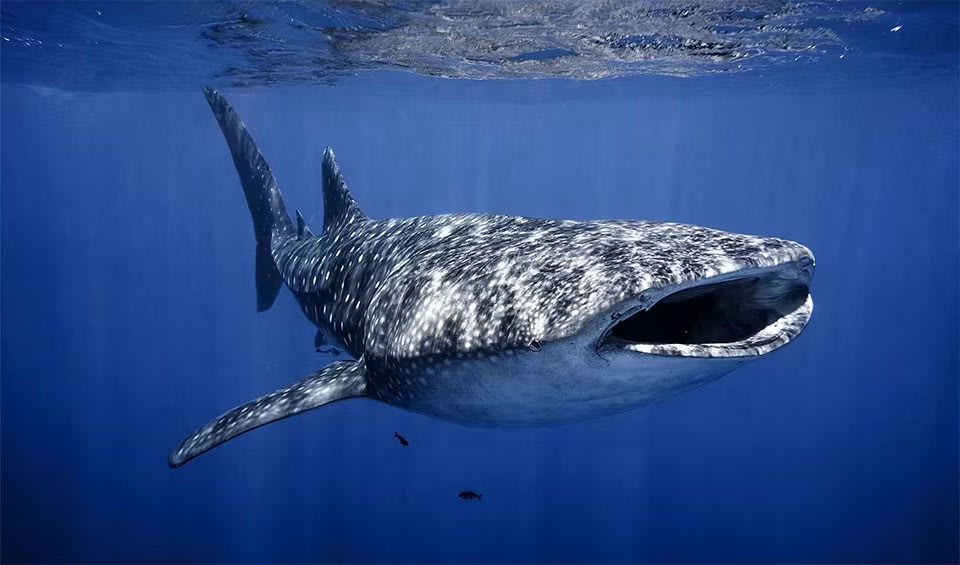The world’s largest living fish, the whale shark, is an awe-inspiring creature that can reach staggering lengths of up to 12 meters (39 feet) and weigh approximately 14 tons (28,000 pounds). Despite their immense size, these gentle giants are renowned for their harmlessness and friendly disposition towards humans. They belong to the Orectolobiformes, encompassing other carpet sharks like nurse sharks and wobbegongs.
Whale sharks are remarkable filter feeders, subsisting on a diet of tiny plankton and small fish. Their feeding process involves sucking water into their enormous mouths, which are equipped with over 300 rows of teeth. However, these teeth are not used for biting or chewing but serve a different purpose. Whale sharks boast five pairs of gill slits, which function as filters, trapping food particles within their mouths as water is expelled. Additionally, they possess a pair of barbels, whisker-like sensory organs located near their nostrils, aiding them in detecting prey in the surrounding water.
These magnificent creatures primarily inhabit warm tropical and subtropical waters found in various parts of the world. Whale sharks are known for their migratory behavior, often traveling long distances for food and suitable breeding grounds. Their significance extends beyond their sheer size, as they play a vital role in maintaining the balance of marine ecosystems by regulating plankton populations and contributing to the health of oceanic food webs.
Distribution
 Atlantic Ocean
Atlantic Ocean Indian Ocean
Indian Ocean Pacific Ocean
Pacific Ocean American Samoa
American Samoa Angola
Angola Anguilla
Anguilla Antigua & Barbuda
Antigua & Barbuda Argentina
Argentina Aruba
Aruba Australia
Australia Bahamas
Bahamas Bahrain
Bahrain Bangladesh
Bangladesh Barbados
Barbados Belize
Belize Benin
Benin Brazil
Brazil British Virgin Is.
British Virgin Is. Brunei
Brunei Cambodia
Cambodia Cameroon
Cameroon Canada
Canada Cape Verde
Cape Verde Cayman Islands
Cayman Islands Chile
Chile China
China Colombia
Colombia Congo-Brazzaville
Congo-Brazzaville Cook Islands
Cook Islands Costa Rica
Costa Rica Cuba
Cuba Curaçao
Curaçao Côte D’ivoire
Côte D’ivoire DR Congo (Kinshasa)
DR Congo (Kinshasa) Djibouti
Djibouti Dominica
Dominica Ecuador
Ecuador Egypt
Egypt El Salvador
El Salvador Equatorial Guinea
Equatorial Guinea Eritrea
Eritrea Ethiopia
Ethiopia Fiji
Fiji French Guiana
French Guiana French Polynesia
French Polynesia Gabon
Gabon Gambia
Gambia Ghana
Ghana Grenada
Grenada Guadeloupe
Guadeloupe Guatemala
Guatemala Guinea-Bissau
Guinea-Bissau Guinea
Guinea Guyana
Guyana Haiti
Haiti Honduras
Honduras India
India Indonesia
Indonesia Iran
Iran Iraq
Iraq Israel
Israel Jamaica
Jamaica Japan
Japan Jordan
Jordan Kenya
Kenya Kiribati
Kiribati Liberia
Liberia Madagascar
Madagascar Malaysia
Malaysia Maldives
Maldives Marshall Islands
Marshall Islands Martinique
Martinique Mauritania
Mauritania Mexico
Mexico Micronesia
Micronesia Montserrat
Montserrat Morocco
Morocco Mozambique
Mozambique Myanmar
Myanmar Namibia
Namibia Nauru
Nauru New Caledonia
New Caledonia New Zealand
New Zealand Nicaragua
Nicaragua Nigeria
Nigeria Niue
Niue Oman
Oman Pakistan
Pakistan Panama
Panama Papua New Guinea
Papua New Guinea Peru
Peru Philippines
Philippines Pitcairn
Pitcairn Portugal
Portugal Puerto Rico
Puerto Rico Qatar
Qatar Saint Helena
Saint Helena Saint Lucia
Saint Lucia Saint Martin
Saint Martin Saint Vincent
Saint Vincent Samoa
Samoa Saudi Arabia
Saudi Arabia Senegal
Senegal Sierra Leone
Sierra Leone Sint Maarten
Sint Maarten Solomon Islands
Solomon Islands Somalia
Somalia South Africa
South Africa St. Kitts & Nevis
St. Kitts & Nevis Sudan
Sudan Suriname
Suriname São Tomé & Príncipe
São Tomé & Príncipe Taiwan
Taiwan Tanzania
Tanzania Thailand
Thailand Togo
Togo Tokelau
Tokelau Tonga
Tonga Turks & Caicos
Turks & Caicos Tuvalu
Tuvalu UAE
UAE US Virgin Islands
US Virgin Islands United States
United States Uruguay
Uruguay Vanuatu
Vanuatu Venezuela
Venezuela Vietnam
Vietnam Wallis & Futuna
Wallis & Futuna Yemen
YemenRecent Updates
July 2024: Researchers have discovered that the whale shark significantly feeds on Sargassum, a brown seaweed prevalent at Ningaloo Reef. Analysis of whale shark tissue revealed compounds from this seaweed, highlighting its importance in the diet of these giant fish.
Sept 2023: According to a study by UK and Mexican researchers published in Scientific Reports, eco-tourism may be influencing the behavior of whale sharks. The research indicates that whale sharks display signs of disturbance when in close proximity to human swimmers.
Anything we've missed?
Help us improve this page by suggesting edits. Glory never dies!
Suggest an editGet to know me
Terrestrial / Aquatic
Altricial / Precocial
Polygamous / Monogamous
Dimorphic (size) / Monomorphic
Active: Diurnal / Nocturnal
Social behavior: Solitary / Pack / Herd
Diet: Carnivore / Herbivore / Omnivore / Piscivorous / Insectivore
Migratory: Yes / No
Domesticated: Yes / No
Dangerous: Yes / No




